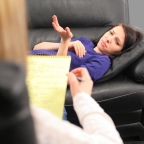
|
Program Description:
This program is aimed at gaining deep knowledge and developing a wide range of skills, techniques and strategies of psychodynamic work with clients. It combines the best world achievements in psychodynamic psychotherapy and practical psychology and the rich experience of leading Russian scientists and psychotherapists. |
|||||
| The elaborate structure of the program allows to get not only profound academic training but also understanding of acquired knowledge. In addition, one of the necessary elements of training is the regular long-term individual supervision. |
|||||
| All teachers of the program are members and candidates of the Moscow Psychoanalytic Society, which is the only member of the International Psychoanalytic Association in Russia, and of the Society of Psychoanalytic Psychotherapy, which is the only full collective member of the European Federation for Psychoanalytic Psychotherapy in Russia. |
|||||
| Thanks to the deep academic knowledge acquired during the training and serious practical work, all graduates will be able to apply their skills in a variety of fields: from successful private practice to work in educational, medical and other institutions solving the most challenging tasks. |
|||||
| Upon training completion, a diploma of professional retraining is issued providing the right to have professional practice in the field of psychodynamic counseling and psychotherapy. |
|||||
| All students who have gone into personal therapy and whose work with clients was regularly supervised during the training period are given a certificate which indicates the duration of personal therapy and the number of supervisors as well as approves the fact that they had real work with clients. |
|||||
|
Practical work — training in the program "Psychodynamic psychotherapy" includes supervision, group supervision, and regular long-term individual supervision.
|
|||||
| Supervision — study of one's practice under the guidance of an experienced clinician in order to develop the clinical skills of the supervised person and to deepen their awareness of the intrapsychic and interpersonal processes that take place during psychodynamic treatment | |||||
| Group supervision — involves the presentation of clinical cases by the group members and their discussion with the supervisor. This allows students to gain experience in solving diagnostic problems and implementing therapeutic strategies. | |||||
| Regular long-term individual supervision is carried out for an in-depth study of the psychotherapeutic impact and dynamics of the transfer-countertransference relationship | |||||
| During the training, a long-term supervision of one clinical case should be carried out. Personal psychotherapy, or psychoanalysis, means that a future psychotherapist undergoes individual psychotherapy (or psychoanalysis) as a patient. This provides them with better self-knowledge as well as with the experience of individual development and working out personal issues. | |||||
| The training ends up with writing an evaluation work which involves an evidence-based study of the psychotherapy conducted with the client. | |||||
| Upon the training completion, a diploma of professional retraining is issued | |||||
| THE PROGRAM STRUCTURE | |||||
|
|||||
| THEORY SEMINARS PROGRAM | |||||
| Techniques of psychoanalysis | |||||
| This section tells about the study of the basic concepts of psychoanalytic techniques and practices: | |||||
|
|
|
|||
| Special attention is paid to the technique of working with narcissistic and pathological types of transference.
Works of following authors are discussed: S. Freud, R. Greenson, P. Heimann, Sh. Roth, O. Kernberg, H. Thome, and H. Kächele, H.Kohut, R. Stolorow, D. and A. Sandler, Th. Ogden, and others. |
|||||
| Clinical psychopathology | |||||
| Study of the main milestones in the development of psychoanalytic conceptualization of psychopathology. Phenomenology of classical neurotic symptoms and psychodynamics of basic neurotic character styles. Diagnosis, pathogenesis, and clinical manifestations of borderline personality disorder and psychosis. Deviations in sexual functionning and psychosomatic diseases. |
|||||
|
Works of following authors are discussed: S. Freud, G. Ammon, J. Bergeret, F. Alexander, M. Klein, R. Fairbairn, |
|||||
| The Psychoanalytic Process: theoretical and technical aspects | |||||
The course starts with this section. It involves the study of topics that prepare students for their own psychoanalytic practice:
|
|||||
| Sigmund Freud's psychoanalytic theory and alternative theories of psychological functioning development | |||||
| Sigmund Freud's psychoanalytic theory and alternative theories of psychological functioning develop-ment. This section examines the fundamental concepts of S. Freud's psychoanalytic theory, such as uncon-scious mental activity, conflict and compromise formation, trauma and affects. It then brings to discus-sion further development of these and other concepts within the framework of object relations theo-ries, ego psychology, H. Kohut's self-psychology and other approaches. Finally, it tells how to practically apply them to a clinical situation. The works of the following authors are discussed: S. Freud, A. Freud, Ch. Brenner, H. Hartmann, B. Moore and B. Fine, V. Tahka, M. Klein, H. Segal, D. Winnicott, R. Fairbairn, F. and R. Tyson, R. Spitz, M. Balint, M. Mahler, H. Kohut, E. Erickson, E. Furman, D. Pines, D. Stern and others. |
|||||
| SIGN UP FOR THE PROGRAM | |||||
| The program is designed for: Persons with higher education in psychology, medicine, pedagogy or social work, or with any higher humanitarian education who would like to get special training in the field of psychodynamic psychotherapy. |
| Benefits of the program:
Thanks to the deep academic knowledge gained during the training and serious practical work, all graduates will be able to apply their skills in a variety of fields: from successful private practice to work in educational, medical and other institutions solving the most challenging tasks. |
Admission conditions:
|
| They also need to fill in the form: |
|
|
Scope and schedule:
The education lasts for 3 years. The total scope of group classes in 3 years is 576 academic hours. Wednesday: 13:00 - 16:15. Saturday: 11: 00 - 14:15 Those who have not previously studied the theory of psychoanalysis should take such additional disciplines as: "Introduction to psychoanalysis”, “Psychoanalytic diagnostics”. |
| SIGN UP FOR THE PROGRAM |
PAYMENT TERMS:
| the full cost of the entire course when paying per semesters (6 payments) | 386 400 ru | 64 400 ru/ semester |
| the full cost of the entire course when paying for a year (3 payments) or for the entire course is |
347 760 ru | 115 920 ru/ semester |
| the full cost of the entire course when paying per month (27 payments) is |
424 980 ru | 15 740 ru/ semester |
Антонова Людмила
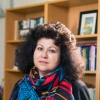
- Преподаватель специализации «Психодинамическая психотерапия».
Корнеева Ирина Николаевна
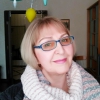
- Преподаватель специализации «Психодинамическая психотерапия».
Смирнова Елена Николаевна
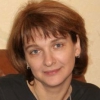
Преподаватель дисциплины "Введение в психоанализ", "Психоаналитическая диагностика" и "Основы психоаналитической техники".
Спиркина Елена Александровна
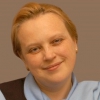
- С 2000 года по настоящее время преподаватель ИППиП;
- Руководитель и преподаватель специализации «Психодинамическая психотерапия».
Трепалина Надежда Юрьевна

- Преподаватель отделений «Психоанализа».
- «Психологического консультирования и психотерапии».
129366, Москва, ул. Ярославская, д.13, корп 1
по тел.: +7 (495) 646-11-08 или по электр. почте: m@psychol.ru
